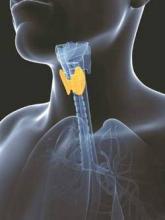Molecular profiling may be useful to thyroid surgeons in a variety of scenarios, but results should be interpreted with proper knowledge of cancer prevalence at the clinician’s institution, report Dr. Robert L. Ferris and coauthors of the University of Pittsburgh Cancer Institute.
A large, prospective single-center study examined seven-gene mutational panel performance, and found that for the AUS/FLUS cytologic category, mutation identification had a positive predictive value of 88% for histologic cancers, with a false-positive rate of 12%, the authors said.
Results from two analyses of the gene expression classifier (GEC) test emphasized the importance of cancer prevalence at the institution in interpretation of negative predictive value (NPV) and positive predictive value (PPV). In the first study, though the overall calculated sensitivity for GEC was 94%, the high malignancy rate at the institution resulted in a lower estimated NPV of 90%. The second study found an estimated sensitivity and specificity to be 83% and 10%, respectively, and decreases in estimated NPV (94%) and PPV (16%), Dr. Ferris and his colleagues reported.
“Given the well established and frequently dramatic variations in cancer prevalence in thyroid cytology specimens, clinicians are urged to be aware of the prevalence of disease by cytologic category in their tested patients and carefully consider how local disease prevalence may change PPV and NPV of molecular diagnostic tests when applied to their unique clinical practice,” the authors said in the report.
Additionally, “the use of molecular profiling in cytologic indeterminate categories should be interpreted judiciously and with discretion by the clinician, who must be aware of institutional cytopathologic performance results, as well as the individual clinical and sonographic factors for each patient,” they concluded.
Read the full article in Thyroid (doi/pdf/10.1089/thy.2014.0502).


